|
1.
CENTRAL AND WEST AFRICA
Cameroon
Domestic politics is the main media focus as Cameroon
heads to October elections. Enforcement of forestry
regulations remains strict as efforts continue to encourage
all operators to adapt to certification and meet EU due-
diligence requirements but operators say there are times
when addressing these issues causes some delays in
despatching consignments to the EU.
Severe flooding in the north is another ‘drag’ on logistics
and the local authorities have to deal with an inflow of
migrants from Chad.
Adverse weather conditions, challenging logistics and
slow international markets have resulted in operators
having to adopt a ‘wait and see’ stance.
Importers have become very selective with Europe
importers maintaining modest orders and markets in Asia
showing limited activity. Harvesting remains focused on
Okoume, Ayous, Sapele, Azobe and Tali.
It is reported that FoB prices for high grade sawnwood
remains stable but that prices for some secondary species
are seeing downward pressure due to weak demand. The
good news is that domestic market is fairly resilient,
supported by ongoing infrastructure and housing projects.
The European Parliament voted to end its Forest Law
Enforcement Governance and Trade Voluntary Partnership
Agreement (FLEGT VPA) with Cameroon. (see page 24)
Gabon
Producers report market activity is quiet. The forestry
administration is uncompromising in its checks on log
diameters and length and on verification of land-tax and
community social-tax payments. Production is reported as
subdued overall though the Azobé market in the
Netherlands and Belgian markets are said to be stable.
Road transport is gradually improving as rains ease and
the temperature in and around Libreville has moderated.
Despite the improved weather timber operations remain
slow due to slow international demand and persistent
transport difficulties. Road conditions between the forest
log yards and mills continue to be a major bottleneck.
Harvesting activity is concentrated on Okoume, Azobe,
Okan and Redwoods. The domestic market shows steady
demand for Okoume and Bilinga for local housing
projects.
Republic of Congo
Production in the Congo is also subdued, say operators.
Veneer mills continue to work steadily and sawmills
focused on red species for markets in the EU are operating
but log supplies to mills in the north is sporadic due to
heavy rains which affects trucking.
On the domestic front producers report stable demand for
key species, especially in urban construction but export
volumes remain below seasonal norms with European
buyers hesitant to commit to large contracts. Prices are
largely unchanged from early August with minor
adjustments for select secondary hardwoods.
Apologies
We apologise to the Rougier Group for inconvenience
caused by incorrect information reported and commend its
efforts to promote the availability of certified products that
meet the highest environmental standards.
Clarification from the Rougier Group
“Contrary to what was announced in the ITTO TTM
Report Volume 29. No. 14, July 2025 the Rougier Group
has not been acquired by a Chinese group but continues to
expand its offering of 100% FSC certified wood products
through its close collaboration with Star ply Group. This
complementary expertise allows Rougier to offer and
guarantee a wide range of Okoumé and Ozigo plywood
that meets the strictest technical (CTBX, KOMO, etc.) and
environmental (FSC) requirements. Since Rougier
plywood are made from logs sourced from Rougier Gabon
concessions which are 100% FSC certified they
complement EUDR import standards thereby meeting the
needs of customers demanding certified sustainable
management and traceability”.
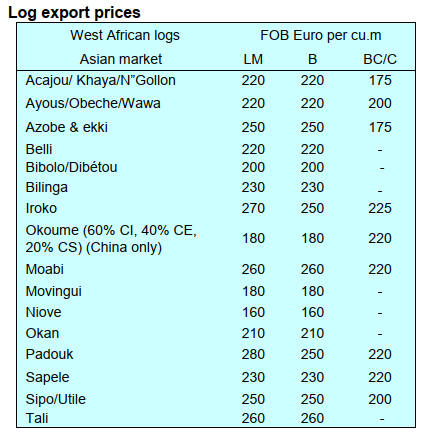
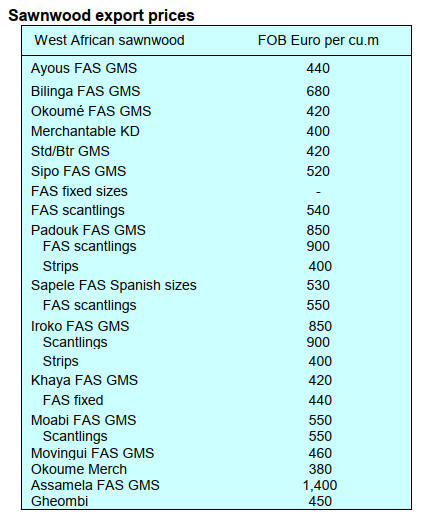
2.
GHANA
Ghana mourns victims of helicopter crash
ITTO is deeply saddened by news of the recent tragic
helicopter crash that took the lives of two cabinet ministers
and six others who were traveling to a newly, cabinet
approved, cooperative mining initiative event with the sole
objective to mine responsibly and safeguard the
environment.
ITTO stands in mourning with the people of Ghana and
extends its condolences to the bereaved families”.
See: https://fcghana.org/fc-mourns-8-compatriots/
2025 half-year exports lag 2024 volumes
According to data from the Timber Industry Development
Division (TIDD) of the Forestry Commission, Ghana’s
cumulative wood product exports for the first half year fell
to 111,348 cu.m in 2025 from 133,126 cu.m in the same
period in 2024, dropping 16% year-on-year amid double
digits decline in almost all wood products shipped.
This decline in volume also translated to a 15% drop in the
export value from Eur60.58 million in 2024, to Eur 51.63
million in 2025.
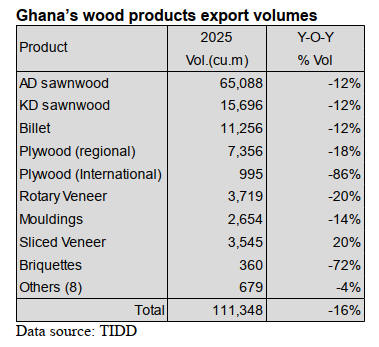
Of the wood products shipped during the period, nine
contributed 110,669 cu.m, representing 99% of the total
export volume. Eight other wood products contributed 679
cu.m in 2025, against 705 cu.m in the first half of 2024.
Plywood and briquette exports dropped by 86% and 72%
respectively. In contrast, sliced veneer shipments
improved by 20% to 3,545 cu.m in 2025.
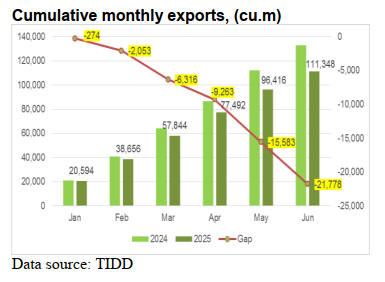
Stakeholders agree to stumpage fees adjustment
After a March stakeholder meeting the Forestry
Commission reviewed timber stumpage fees to be
implemented mid-August 2025. This was in response to a
petition by the Ghana Timber Millers’ Organisation
(GTMO).
A stakeholder engagement brought together the Executive
Management Team of the Forestry Commission,
traditional authorities, representatives of the Office of the
Administrator of Stool Lands (OASL) and timber industry
executives.
At the event the President of the National House of Chiefs,
Ogyeahohuo Yaw Gyebi II, highlighted the pressing need
to address the financial challenges confronting the timber
sector. He noted that the appreciation of the local currency
against other major international currencies has led to a
decline in export revenue while operational costs have
remained high.
The Plantations Investment and Extension Manager of the
Forest Services Division, Mr. Kwame Agyei, provided
some technical insight into the fee adjustment proposed.
He explained the progressive alignment of the fees with
the implementation of 30% of the legally mandated fees in
2025 with plans to scale-up to 70% over two years.
Participants unanimously agreed that the proposed
adjustment was fair and conducive to the sustainable
development of the timber industry.
In his remarks, the Acting Chief Executive of the Forestry
Commission, Dr. Hugh Brown, reiterated the
Commission’s commitment to constructive dialogue.
Professor Martin Oteng-Ababio, Chairman of the Forestry
Commission Board also commended all parties for their
constructive participation. He underscored the importance
of timely interventions to sustain the industry and
reaffirmed the Forestry Commission’s full commitment to
its growth.
See: https://fcghana.org/fc-adjusts-stumpage-fees-to-support-
timber-industry/
GSA has new mandate to regulate commercial shipping
The Ghana Shippers Authority (GSA) is soon to
implement a new shipping regulation that will make
conducting business at the port easier according to the
Minister of Transport, Joseph Bukari Nikpe.
Addressing members of the new GSA board of directors
the Minister said a draft legislative instrument has been
developed in order to implement the new GSA Act 2024
(Act 1122) which was passed by parliament in July last
year.
According to the Minister there is a growing concern
about multiple state agencies involved in port procedures
and processes which leads to high transaction cost at the
ports. He explained that the new law will enable GSA to
improve turnaround time at the ports.
In a related development, the GSA says it will crack down
on shipping lines that flout the new Bank of Ghana
guidelines on foreign exchange rates at the ports. The
Chief Executive of GSA, Prof. Ransford Gyampo, said the
authority aims to ensure fair pricing in the freight industry.
See: https://thebftonline.com/2025/07/25/gsa-expects-total-
control-with-new-shipping-regulation/
and
https://mot.gov.gh/10/16/1/251/minister-urges-new-shippers-
authority-board-to-slash-port-costs-boost-24-hour-economy
Tariff on Ghana exports to the US
Ghana’s exports to the United States now attract a 15%
US import tariff. This will undermine the competiveness
of Ghana’s exports in the US. The US accounts for close
to 10% of Ghana’s wood products exports. Exports to the
US include kiln-dried sawnwood, rotary veneer and sliced
veneer.
See: https://www.myjoyonline.com/15-tariff-on-goods-entering-
u-s-starts-today-august-7/
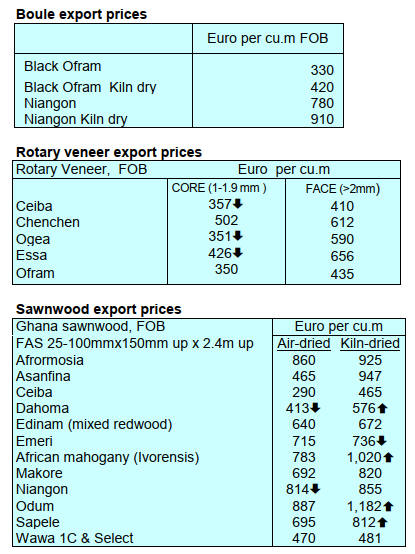
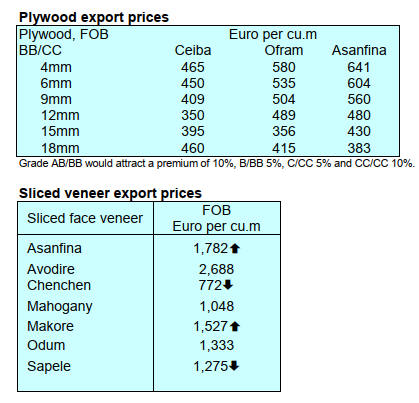
3. MALAYSIA
Private sector welcomes reduced US tariff
Malaysian industries have welcomed the reduced tariff
imposed by the US to 19% down from 25%. The
Federation of Malaysian Manufacturers (FMM) president,
Soh Thian Lai, said the positive outcome reflects the result
of constructive dialogue and engagement between the
Malaysian and US governments.
Soh said that, while it is still early to assess the full extent
of the impact of the tariff rate cut, the FMM anticipates
that export-oriented industries may benefit from improved
competitiveness.
Malaysian Furniture Council president, Desmond Ta, said
the reduction from 25% to 19% is positive news for the
industry as the United States remains Malaysia’s number
one export destination. The finalisation of an agreement on
tariff rates will reduce uncertainty but exporters will still
need to adapt to a higher-cost environment, he said.
See:
https://www.thestar.com.my/news/nation/2025/08/02/malaysian-
industries-can-breathe-easier-now
Malaysia challenged EUDR ‘Standard Risk’ classification
Recently, representatives from the Malaysian Timber
Association (MTA) visited EU industry counterparts,
policymakers and competent authorities. Malaysia is
classified as “Standard Risk” under the European Union
Deforestation Regulation (EUDR) which subjects
Malaysian goods to a high level of checks, this was met
with dismay by industry groups. The Malaysian Palm Oil
Council said this overlooks the efforts taken by Malaysia
to address deforestation risks in the oil palm sector.
Despite Malaysia’s challenge to the classification of
“Standard Risk” this is unlikely to be changed before the
reassessment in 2026. The MTA has said it will keep
engaging with EU stakeholders and the Malaysian
government to ensure products is accepted in the EU
market.
Based on their engagements with EU competent
authorities that ensure operators and traders comply with
the EUDR the MTA representatives said that it determined
that not every EU member state is ready to implement the
regulation.
See: https://theedgemalaysia.com/node/763054
Trading forecast to face challenges in second half of 2025
In an interview with the Star newspaper, Hong Leong
Investment Bank Research (HLIB Research) indicated the
Bank remains neutral on the wood manufacturing sector as
conditions are expected to stay difficult in the second half
of this year amid weak demand, margin pressures and
currency volatility.
For the second half of 2025 the Bank suggested the
operating environment is expected to remain tough, with
pressures from a weaker US dollar, tariff risks and rising
domestic production costs.
See :https://www.thestar.com.my/business/business-
news/2025/08/08/tricky-conditions-ahead-for-companies-in-
wood-sector
Boosting downstream teak manufacturing
The Forest Research Institute Malaysia (FRIM) and the
Perlis Forestry Department (JPNPs) have strengthened
collaboration to boost the value of Perlis teak, aiming to
support community economic development through
downstream production.
FRIM Director-General Dr. Ismail Parlan said these
downstream products, derived from teak plantations,
contribute directly to environmental sustainability efforts.
FRIM continues to enhance the branding of teak based
products by building a strong market reputation. Initiatives
like the ‘Royal Perlis Jati Craft’ and the push for
Geographical Indication status are expected to increase the
value and marketability of Perlis teak products, Dr. Ismail
added.
See:
http://theborneopost.pressreader.com/article/281891599325305
Bamboo plantations for use in metal industry
The Sarawak Timber Industry Development Corporation
(STIDC) has signed a memorandum of understanding
(MoU) with Pertama Ferroalloys Sdn Bhd to develop a
commercial bamboo plantation within licensed forest areas
in the State. The bamboo material is expected to be
processed used in the company’s manufacturing process.
Under the MoU, STIDC will assist Pertama Ferroalloys in
identifying suitable forest plantation areas for bamboo
cultivation, supply high-quality bamboo seedlings and
provide technical services in bamboo resource
management.
See:
http://theborneopost.pressreader.com/article/281548001966386
4.
INDONESIA
August export benchmark prices for August
2025
Veneers (prices per cu.m)
Natural forest veneer US$644
Plantation forest veneer US$635
Wooden sheet for
packaging Box US$960
Wood chips (prices per tonne)
Woodchips
chips or particles US$104
Woodchips US$97
Processed wood (prices per cu.m)
Processed wood products which are leveled on all four
sides so that the surface becomes even and smooth with
the provisions of a cross-sectional area of 1,000 sq.mm to
4,000 sq.mm (ex 4407.11.00 to ex 4407.99.90)
Meranti (Shorea sp) US$1,450
Merbau (Intsia sp) US$841
Rimba Campuran US$769
Ebony US$1,980
Teak US$2,506
Pine and Gmelina US$808
Acacia US$738
Sengon (P. falcataria) US$1,103
Rubberwood US$337
Balsa, Eucalyptus US$653
Sungkai (P.canescens) US$1,298
Processed wood products which are levelled on all four
sides so that the surface becomes even and smooth of
Merbau wood with the provisions of a cross-sectional area
of 4,000 sq. mm to 10,000 sq.mm (ex 4407.11.00 to ex
4407.99.90) = US$1,500/cu.m
See: https://jdih.kemendag.go.id/peraturan/keputusan-
menteri-perdagangan-nomor-1693-tahun-2025-tentang-
harga-patokan-ekspor-dan-harga-referensi-atas-produk-
pertanian-dan-kehutanan-yang-dikenakan-bea-keluar
Furniture industry - a significant downturn in the second quarter of 2025
The Indonesian furniture industry experienced a
significant downturn in the second quarter of 2025 with its
contribution to GDP contracting.
According to the Indonesian Furniture and Craft Industry
Association (HIMKI) this deep contraction was due to a
combination of factors including global geopolitical
uncertainty and high-interest rates that have dampened
purchasing power in consumer markets.
These issues have suppressed demand in key export
markets like the US and Europe and have made
international buyers hesitant to commit to long-term
agreements. Domestically, the industry is also struggling
with challenges such as high minimum wages and rising
logistics costs which are eroding competitiveness,
especially for smaller businesses.
In response to these challenges businesses have set a
conservative growth target of less than 2% for the entire
year, a goal that can only be met if global demand remains
stable.
See: https://www.msn.com/id-id/berita/other/kinerja-industri-
mebel-anjlok-pengusaha-masih-waspadai-efek-tarif-trump/ar-
AA1K0lll?ocid=BingNewsVerp
Furniture importers shifting to Viet Nam
Indonesian furniture exporters are facing a significant
challenge following the 19% import tariff by the United
States. According to the Indonesian Furniture and Craft
Industry Association (HIMKI), this tariff, though lower
than a previously threatened 32%, is eroding profit
margins and causing US buyers to shift orders to
competitors like Viet Nam which has similar tariffs but
more established production efficiency.
The tariffs particularly impact medium to premium
wooden products which constitute a large portion of
Indonesia's US$1.5 billion annual furniture exports to the
US.
The HIMKI is calling for diplomatic efforts to lower the
tariff or secure exemptions for labour-intensive industries.
They also propose a multi-pronged strategy that includes
providing fiscal incentives to exporters, accelerating the
diversification of export markets beyond the US and
strengthening the industry's production capacity and
competitiveness.
Finally, HIMKI stressed the importance of protecting the
domestic market from an influx of imported goods from
countries like China and Viet Nam.
See: https://bali.tribunnews.com/2025/08/07/ekspor-furnitur-ke-
as-kena-tarif-19-persen-himki-buyer-beralih-ke-vietnam.
Business transactions of IDR8.5 billion in South Africa
Indonesian furniture and home decoration products
recorded potential transactions of IDR8.5 billion likely
from participation at the Decorex Johannesburg Exhibition
in South Africa.
Indonesia’s participation, its first in a long time, was a
strategic move to explore new markets to mitigate the risks
posed by tariffs. According to Efri Yenni, Head of the
Indonesian Trade Promotion Center (ITPC) Johannesburg,
the strong visitor turnout at the Indonesian pavilion
indicates a positive reception and enthusiasm for
Indonesian products.
This market holds significant promise for Indonesia as
South Africa is not a major wood-producing country
giving Indonesian products a competitive edge. However,
Indonesian exporters must carefully consider their pricing
strategy to overcome the challenges of high logistics and
import duties.
The market is also competitive with main rivals including
China, Thailand, Poland, Germany and Viet Nam. In 2024,
Indonesia's furniture and home decor exports to South
Africa were valued at just US$15.3 million, representing
only 2-3% of the total market, highlighting the substantial
room for growth.
See: https://voi.id/ekonomi/503190/produk-dekorasi-rumah-ri-
laris-di-afrika-selatan-catatkan-transaksi-potensial-rp8-5-miliar
Carbon trading, a way to create green Innovation
The Voluntary Carbon Market (VCM) presents significant
opportunities for Indonesia, according to Ignatius Wahyu
Marjaka of the Ministry of Environment and Forestry.
The VCM can provide innovative climate funding,
especially for mitigation and adaptation projects. It also
offers diversified revenue streams for landowners and
forest managers by monetising ecosystem preservation.
Beyond financial benefits the VCM can accelerate climate
action by enabling companies and individuals to offset
emissions thereby speeding up the adoption of low-carbon
technologies and sustainable practices.
See:
https://m.antaranews.com/amp/berita/4986637/perdagangan-
karbon-sukarela-buka-jalan-pendanaan-iklim-inovasi-hijau
Zero tolerance on forest burning - Minister Gunawan
Coordinating Minister for Political and Security Affairs,
Budi Gunawan, announced that the government will take
firm action against anyone who knowingly clears forest by
burning.
The government has adopted a clear policy of zero
tolerance for this practice, said the Minister. While
acknowledging that both communities and corporations
need land for their businesses, the President is encouraging
the use of modern, high-tech and environmentally friendly
land clearing methods.
To support this new policy the government will provide
communities and companies with access to alternative
technologies for land clearing. This programme will
include offering heavy machinery, eco-friendly tools and
technical assistance. The initiative will be rolled out
gradually starting in areas most prone to forest fires,
particularly West and Central Kalimantan.
See: https://en.antaranews.com/news/370965/indonesia-adopts-
zero-tolerance-on-forest-burning-minister-gunawan
Ministry to invite CSR funds for mangrove rehabilitation
The Ministry of Forestry is developing an investment
policy and institutional road map to attract public and
private sector funding for mangrove rehabilitation.
According to Ristianto Pribadi, Director of Mangrove
Rehabilitation, the initiative includes offering land plots of
around 6.25 hectares to the public as part of the strategy.
The road map will support funding through corporate
social responsibility (CSR), international cooperation and
blended finance models. A public campaign will be
launched to promote the initiative and encourage broader
participation. Of Indonesia’s 3.44 million hectares of
mangrove ecosystems, approximately 770,000 hectares are
identified as suitable for rehabilitation.
See: https://koran-jakarta.com/2025-07-25/rehabilitasi-
mangrove-kemenhut-libatkan-publik
Sustainable forest management by communities
The ‘Strengthening of Social Forestry in Indonesia’
project (SSF Project) has successfully empowered
communities and advanced sustainable forest
management. According to Forestry Minister, Raja Juli
Antoni, this initiative is part of a national strategic project
aimed at ensuring forests benefit a wider population, not
just a small elite.
The SSF Project has surpassed its goals, granting legal
access rights to 364,274 hectares of forest land to 706
community groups, representing over 86,000 households.
The Minister emphasised the importance of continued
collaboration among all stakeholders to ensure the
project's long-term success and guarantee community
welfare.
See: https://www.tempo.co/info-tempo/proyek-ssf-berhasil-
wujudkan-pengelolaan-hutan-lestari-oleh-masyarakat-2050779
IEU-CEPA grants zero tariffs to several export commodities
The Ministry of Trade announced that several Indonesian
export commodities will benefit from zero tariffs under the
Indonesia–European Union Comprehensive Economic
Partnership Agreement (IEU-CEPA).
According to Djatmiko Bris Witjaksono, Director General
of International Trade Negotiations, these benefits will
take effect on Entry Into Force (EIF) of the Agreement.
The IEU-CEPA ensures market access for goods with both
Indonesia and the EU agreeing to eliminate tariffs.
Witjaksono added that Indonesian products such as
footwear, textiles, fisheries, biodiesel, electronics,
agriculture, forest products and steel have a strong
competitive advantage and will gain optimal market access
under the agreement.
See: https://en.antaranews.com/news/371041/ieu-cepa-grants-
zero-tariffs-to-several-export-commodities
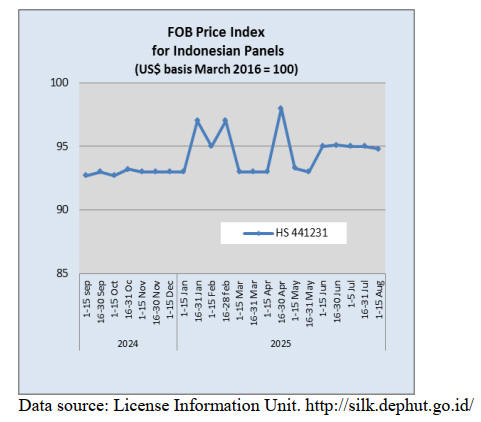
5.
MYANMAR
Government reshuffled in advance of election
Myanmar's military leadership has dissolved the State
Administration Council (SAC), the governing body
installed after the 2021 coup and replaced it with a
"caretaker government." This has been promoted as a
necessary step towards holding a general election.
Senior General Min Aung Hlaing has stepped down as
prime minister but has now assumed the role of interim
President. He will also chair a newly formed "State
Security and Peace Commission” which will oversee the
planned election. U Nyo Saw has been appointed as the
new Prime Minister.
Malaysia will lead a regional delegation to Myanmar in
September according to Malaysian Foreign Minister Datuk
Seri Mohamad Hasan. The visit will include the Foreign
Ministers of Indonesia, Thailand and the Philippines.
See- https://thediplomat.com/2025/08/myanmar-military-ends-
state-of-emergency-to-prep-for-election-at-years-
end/#:~:text=As%20The%20Irrawaddy%20reports%2C%20Min,
serve%20as%20the%20interim%20president
and
https://www.aljazeera.com/news/2025/7/31/myanmar-ends-state-
of-emergency-before-planned-elections
and
https://www.malaymail.com/news/malaysia/2025/08/08/malaysia
-to-head-asean-mission-to-assess-myanmars-post-emergency-
election-plans/186941
UNDP highlights migration surge and cautious hope among youth
A recent UNDP report warns that Myanmar's youth are "a
generation on the move" driven by economic collapse,
armed conflict and political instability.
The report “A Generation on the Move: Youth Migration
and Perceptions in Myanmar” reveals high migration
intentions that could deepen the country's brain drain but
also underscores potential for recovery if conditions
improve.
The report estimates that 300,000 to 500,000 youth had
migrated abroad since 2021 exacerbating labour shortages
in key sectors.
Nearly 40% of surveyed youth said they would leave
Myanmar if possible with rates peaking at 60% in conflict-
hit Rakhine State and around 50% in Chin and Yangon.
Intentions rise sharply with education level with 52%
among those with higher education versus 24% with none
raising alarms about losing skilled talent.
On peace, 68% believe it's achievable and 66% strongly
back ceasefire and reconciliation efforts. Priorities split
evenly: 62% see democracy and socio-economic
development as equally vital, though migrants lean
slightly toward democracy.
UNDP urges immediate interventions to retain and empower youth through:
-- Boosting the economy: Expand entrepreneurship, skills training, digital
jobs and
finance access.
-- Rebuilding education: Invest in remote learning, vocational program, and
scholarships with return incentives.
-- Fostering peace: Engage youth in community reconciliation.
-- Enabling safe migration: Negotiate labour pacts and protect migrants.
"Without targeted action, Myanmar risks losing its most
skilled generation", the report concludes.
See - https://www.undp.org/sites/g/files/zskgke326/files/2025-
08/a_generation_on_the_move_undp-myanmar_0.pdf
6.
INDIA
Depressed domestic panel demand challenges panel
manufacturers
The correspondent reports Indian panel product
manufacturers continue to face unprecedented challenges
despite the halt to imports that began on Feb 28, 2025 due
to implementation of the new Standard requirments.
Domestic demand remains sluggish with no significant
increase in sales. This stagnation is alarming given the loss
of approximately 700 containers per month of imported
panel products.
An article in Ply Insights offers suggestions on the key
issues facing the panel industry.
-- rising raw material cost vs. falling sales.
-- price of essential raw material has been steadily increasing.
-- sales volumes have dropped putting immense pressure on margins.
-- small and micro manufacturing units are worst hit, with production down
by nearly 30
-- market credit availabilty is worsening.
-- increased credit cycle is leading to liquidity crunches for
manufacturing and dealers.
-- delayed payments are causing further operational difficulties.
-- regularly Pressure from the BIS regulation
It it reported that BIS compliance has resulted in a 6-7%
increase in costs whichwill be passed on to endusers.
Despite the government’s restriction on imports, domestic
industries are still struggling to capture more market share
and meet demand effectively. This, says Ply Insights,
suggests systemic issues that cannot be resolved by import
restrictions alone.
Ply Insight reports an industry wide call for Government
support and industry unity saying to safeguard the future
of the Indian plywood and related industries it is
imperative that there is dialogue with government. The
industries are also request immediate relaxation on import
of logs core veneer and face veneer as these inputs are
essential for the sustainability and growth of the wood
panel sector in the country.
See: https://plyinsight.com/current-situation-of-the-plywood-
industry-in-india/
High US tariff undermines competitiveness
Indian businesses expect a dramatic decline in export
orders as tariffs of 50% on Indian exports to the US
destroys competitiveness. For exporters the hope is that
there will be a breakthrough in negotiations.
The reciprocal tariff creates a competitive disadvantage
compared to peers from countries with lower tariffs and
some exporters report US orders have already been put on
hold as buyers reassess sourcing decisions. For a large
number of SME led sectors trying to absorb the tariff is
simply not viable according to the Federation of Indian
Exporters Organisation (FIEO) president S.C.Ralhan.
Mithileshwar Thakur, Secretary General of the Apparel
Export Promotion Council (AEPC), said it remains to be
seen how negotiations progress when the US team visits
India for the sixth round of talks.
Amid the rush to seek government support some people
suggested a focus on market diversification, said FIEO
Director-General Ajai Sahey. Some of India’s trade
agreements (EU and UK) are going to come into effect
soon but the impact will not be felt for some time.
See: https://timesofindia.indiatimes.com/business/india-
business/trump-tariffs-exporters-on-edge-fear-losing-
orders/articleshow/123149915.cms
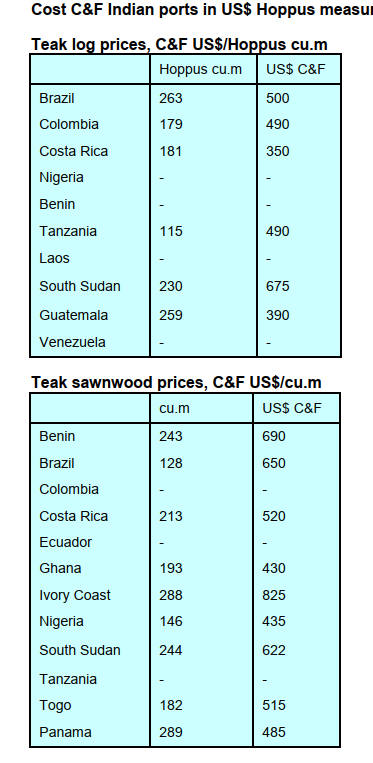

7.
VIETNAM
Wood and wood product (W&WP) trade
highlights
The Viet Nam Customs Office has reported W&WP
exports in July 2025 reached US$1.45 billion, up 5%
compared to July 2024. The WP export was shared US$1
billion, up 2% compared to July 2024.
For the first seven months of 2025 W&WP exports
totalled US$9.6 billion, up 8% compared to the same
period in 2024 of which WP exports alone contributed
US$6.6 billion, up 8% compared to the same period in
2024.
Viet Nam’s import of raw wood (logs and sawnwood) in
June 2025 reached 626,100 cu.m, worth US$213.9
million, down 7% in volume but up 1% in value compared
to May 2025. Compared to June 2024 imports were up
36% in volume and up 41% in value.
In total, for the first six months of 2025, raw wood imports
were 3.28 million cu.m, worth US$1.04 billion, up 33% in
volume and up 27% in value compared to the same period
in 2024.
NTFP exports in July 2025 decreased for the second
consecutive month earning US$66 million, down 11%
compared to June 2025 and down 4% compared to the
same period in 2024.
The total export value of these products in the first seven
months of 2025 was estimated at US$507.97 million, up
6% compared to the same period in 2024.
W&WP exports to Japan in July 2025 brought in about
US$166 million, up 1% compared to July 2024. In the first
seven months of 2025 W&WP exports to Japan were
valued at US$1.18 billion, up 23% compared to the same
period in 2024.
Living and dining room furniture exports in July 2025
amounted to US$215 million, down 11% compared to July
2024. In the first seven months of 2025 exports of living
and dining room furniture totalled US$1.5 billion, up 1%
compared to the same period in 2024.
Surging wood pellet exports to Japan
Japan remains one of Viet Nam’s fastest-growing and
most significant markets for wood-based exports with
multiple product categories showing strong growth.
Exports to Japan, first half 2025
-- Wood pellets: US$405.8 million (+96% YoY)
the leading product accounting for 40% of total exports.
-- Woodchips: US$302.3 million (+6 YoY).
-- Wooden furniture: US$188.6 million (-6% YoY).
-- Wood-based panels and floorings: US$82.2 million (+4% YoY).
Wood pellets and woodchips jointly represent 70% of total
wood and wood product exports to Japan underlining their
strategic role in the trade relationship.
According to Japan Customs, in the first half of 2025 total
imports under HS code 4401 (wood pellets and chips)
reached 9.6 million tonnes valued at JPY272.3 billion, up
17% in volume and 13% in value YoY. Imports from Viet
Nam surged to 4.9 million tons worth JPY130.4 billion up
42% in volume and 42% in value YoY.
In the first half of this year Viet Nam held a 50% market
share in this category, far ahead of Australia, the U.S.,
Canada, South Africa and Thailand.
Imported wood pellets are primarily for biomass power
generation while imported wood chips and domestic chips
are mainly for paper making.
Viet Nam’s wood pellet exports to Japan are experiencing
record growth driven by Japan’s aggressive biomass
energy expansion. While the furniture segment faces
structural challenges, targeted adaptation in design,
sustainability and pricing can help Viet Nam maintain a
strong foothold in the Japanese market.
To Xuan Phuc, a Senior Policy Analyst at Forest
recommended that businesses on Viet Nam should invest
in developing dedicated raw material zones to reduce
reliance on secondary supply sources so as to comply with
legality and sustainability standards, said an expert.
Average export prices reached US$144.3 per tonne for
Japan and US$109.2 per tonne for South Korea. Since
September 2024 prices to South Korea have risen.
It has been pointed out that heavy reliance on two markets,
while offering advantages in terms of geographic
proximity and biomass energy incentive policies there are
risks as demand may fluctuate in response to policy shifts
or global energy trends.
Another challenge is quality, said Phuc. Nguyen Thanh
Phong, Head of the Viet Nam Wood Pellet Sub-
Association under Viforest further explained that that
removing bark can help meet quality standards, particularly
in Japan but would significantly raise production costs.
He added, the absence of industry coordination and a
cohesive development strategy remains an issue to be
addressed. The pellet sector is highly fragmented with
large players accounting for 70% of exports while smaller
producers operate in isolation.
Phuc suggested that cooperative ecosystem among
businesses that share sustainable raw material sources
across multiple product lines offers a viable path forward.
At the macro level, there needs to be supportive policies
such as planning the wood pellet sector within the broader
wood ecosystem, providing incentives for biomass energy
and controlling unfair competition.
These measures would help create a sustainable
development environment and enable businesses to
compete effectively both domestically and internationally,
he said.
Improving quality, building brand identity and diversifying
markets beyond Japan and South Korea - such as
expanding into the EU - are strategic steps for the wood
pellet industry to assert its position, Phuc added.
See: https://theinvestor.vn/Viet Nams-wood-pellet-industry-
needs-production-standardization-to-meet-global-demand-
experts-d16312.html
Viet Nam’s BIFA WOOD 2025 highlighed automation in
furniture manufacturing
This year BIFA WOOD 2025, held 6 August in Ho Chi
Minh City, focused on "Smart Furniture Solutions" as the
central theme. The exhibition highlighted advanced
manufacturing solutions including process optimisation
and digital technologies, positioning the fair as a platform
for connecting policymakers and businesses and fostering
sustainable production-consumption partnerships in the
wood sector.
The event was organised by the Viet Nam Wood Industry
Fair JSC, in support of the goal to accelerate digital
transformation and automation in wood processing. The
event featured over 1,000 booths, gathering companies
from Viet Nam, the US, Europe, Japan, China and Taiwan
P.o.C.
In addition to showcasing high-quality machinery and
materials, the fair included B2B networking events,
market trend seminars and the signing of strategic
cooperation agreements between local and international
enterprises.
According to Ha Van Ut, Deputy Director of Ho Chi Minh
City’s Department of Industry and Trade, the fair not only
introduces cutting-edge technologies but also reflected the
robust development of Viet Nam’s wood processing
industry.
Ut emphasised HCM City's pivotal role as Viet Nam’s
most dynamic economic hub following the recent
administrative merger. The city is instrumental in
expanding and diversifying both export and domestic
markets.
See: https://en.Viet Namplus.vn/Viet Nams-bifa-wood-2025-
highlights-automation-in-furniture-manufacturing-
post324104.vnp
8. BRAZIL
Impact of US tariff on the Brazilian forestry
sector
The tariff announced by the United States on products
from Brazil is already having an impact on Brazil’s forest
sector exports including cancellation of orders. Companies
in the South, Southeast and Amazon Regions, including
those operating with timber sourced from natural forests,
are facing operational shutdowns and growing uncertainty
regarding exports.
The US market is critical, especially for manufacturers of
flooring, panels and mouldings whose products are often
custom designed for the US construction industry.
Under the new tariff companies say maintaining exports
not feasible as the 50% tariff cannot be absorbed. Industry
leaders, such as the National Forum of Forest-Based
Activities (Fórum Nacional das Atividades de Base
Florestal - FNBF) and the Brazilian Association of
Mechanically Processed Timber Industry (Abimci) are
warning of the lack of alternative markets capable of
absorbing the current export volumes and are urging the
Brazilian government to take immediate action.
The suggestions include diplomatic negotiations with the
US and seek to postpone the tariff’s implementation date
and establishing commercial conditions similar to those
granted to competing countries such as Vietnam,
Indonesia and Chile.
Abimci has released a preliminary statement on the new
US Executive Order (dated July 30) which imposes an
additional 40% tariff on imported products including those
from Brazil.
According to the initial analysis, most wood products,
especially those sourced from planted forests, were not
included in the list of exemptions (Annex I) and will
therefore be subject to the new surcharge.
Abimci highlighted specific concerns that require further
technical analysis within the measure’s text regarding the
exemption of products under investigation in Section 232
of the Trade Expansion Act, listed in Annex II of the
previous order (April 2).
Although these products appear to be exempt, there are
fears they will also be affected by the new tariff with the
possibility that they may also be subjected to the
additional rate.
Only products listed in Annex I of the new measure, such
as NCM 44.07.29.02 (tropical sawnwood), appear exempt
from the new tax.
See: https://agro.estadao.com.br/economia/tarifaco-afeta-setor-
florestal-madeira-parada-contratos-cancelados-e-fabricas-
fechadas
and
https://abimci.com.br/cautela-deve-nortear-estrategias-da-
industria-de-madeira-do-brasil/
Strengthening support for small forestry businesses
A partnership agreement between the Center for Timber
Producing and Exporting Industries of the State of Mato
Grosso (CIPEM), the Federation of Industries of the State
of Mato Grosso (Fiemt) and Sebrae MT has been renewed
until December 2026.
This renewal ensures the continuation of the “Empreenda
Mais Indústria (Mores Entrepreneurship in Industry)”
Programme which aims to strengthen small industrial
businesses. The agreement was formalised during a Fiemt
board meeting attended by key representatives.
The collaboration between CIPEM and Sebrae has led to
significant initiatives such as the Business Roundtable
held during the Sustainable Wood event which brought the
production sector closer to the market. The institutions
involved highlighted the importance of this partnership for
regional development, strengthening the forest-based
sector and creating new opportunities for small producers.
As a next step, an additional Sustainable Wood event is
planned to take place in the Northeastern region of Brazil.
This event will focus on promoting forest products and
generating business opportunities. Sebrae reaffirmed its
commitment to supporting business owners and
encouraging greater participation in the program.
See: https://cipem.org.br/renovacao-de-parceria-entre-cipem-
fiemt-e-sebrae-fortalece-apoio-as-pequenas-industrias/
Timber exports stable in first half of 2025
The Brazilian Association of Mechanically Processed
Timber Industry (ABIMCI) reported that Brazilian exports
of wood products remained stable during the first half of
2025, despite a challenging global scenario.
The sector faced tariff barriers imposed by the United
States and protectionist measures in the European Union
(EU) which have impacted trade routes and increased
logistics costs.
According to ABIMCI, even amidst a complex scenario,
including the opening of investigations that generate
uncertainty and impact the purchasing decisions of
international clients, such as the U.S. Trade Expansion Act
Section 232 investigation assessing whether wood imports
threaten US national security, as well as anti-dumping and
injury cases filed by the EU against Brazilian pine
plywood, some segments managed to post growth or
maintain stable volumes.
In the first half of the year pine sawnwood exports
recorded an increase of approximately 6% in volume
compared to the same period in 2024. Pine plywood saw a
slight decline of 4%, while the mouldings segment
remained virtually unchanged. Exports of wood pellets
also grew during the period.
From a logistics standpoint, there was an improvement in
the flow of goods through ports in southern Brazil. The
resumption of operations at the Port of Itajaí, the
expansion of the back area at the Port of Itapoá and the
creation of new operational zones in Navegantes all
located in the state of Santa Catarina, helped reduce cargo
backlogs and booking transfers, factors that had previously
negatively affected exporting companies.
According to ABIMCI, the sector should remain alert to
market dynamics, which may change depending on
competition for logistics space with other industrial
segments at Brazilian ports.
If progress is made in tariff negotiations during the second
half of the year there could be greater business
predictability, encouraging consumer markets to rebuild
inventories and helping normalise trade flows.
See: https://abimci.com.br/setor-madeireiro-registra-
estabilidade-nas-exportacoes-no-primeiro-semestre-de-2025/
Brazil prepares strategy to attract investment sustainable development
projects
The State of Amapá is arranging to showcase the bio-
economy and low-carbon economy markets at the 2025
United Nations Climate Change Conference (COP30) to
be held in November in the State of Pará in the Amazon,
Brazil.
With 97% of its native forest preserved and 73.5% of its
territory under protected areas, Amapá will participate in
COP30 committed to attracting investments and
contributing to debates on climate change and the
protection of traditional peoples.
In partnership with French Guiana the state of Pará will
present the “International Amazon at the Border” and
“Black Amazon” initiatives, the latter including Suriname
and the Republic of Guyana.
To this end, the State government has established a
Technical and Executive Committee, which developed the
“Amapá at COP Plan” to be officially launched in early
August with the presence of the COP30 President and
Ambassador to Brazil. The aim is to leverage Amapá’s
significant environmental assets to sustainable
development projects.
The plan is built on three strategic pillars: the first focuses
on forests, emphasising biodiversity, the bio-economy and
the sustainable use of Amazonian natural resources; the
second addresses energy, covering energy matrices and the
transition to renewable sources; and the third encompasses
the mining and oil sectors, regarded as legitimate sources
of financing for sustainable projects and for boosting the
bioeconomy.
See: https://chicoterra.com/2025/08/05/100-dias-para-a-cop30-
com-97-de-sua-floresta-nativa-preservada-amapa-se-prepara-
para-atrair-investidores-no-mercado-de-bioeconomia/
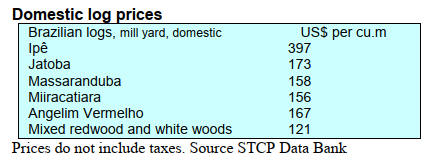
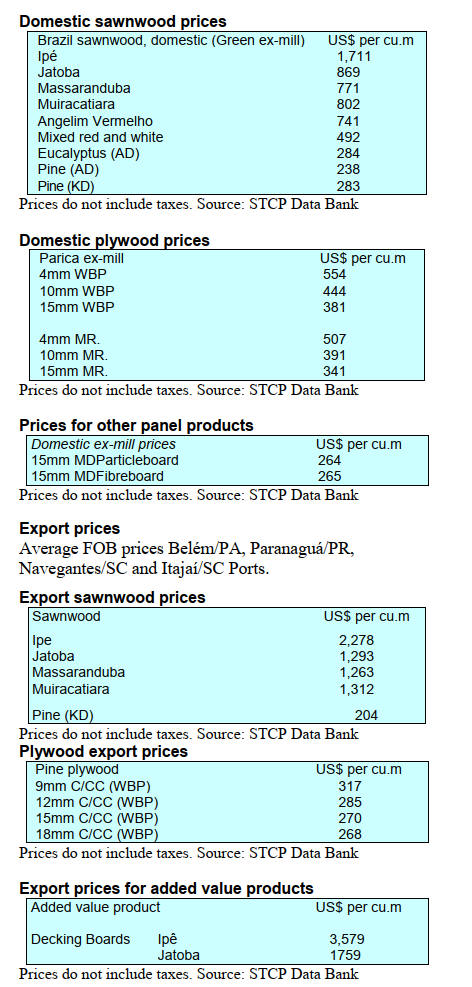
9. PERU
Challenging
markets – exports decline
Shipments of wood products totalled US$26.8 million
during the first five months of 2025 representing a
decrease of 23% compared to the same month in 2024
(US$34.9 million), according to the Center for Global
Economy and Business Research of the CIEN-ADEX
Exporters Association.
According to figures from the ADEX Data Trade
Intelligence System, exports included sawnwood
(US$11.6 million), semi-manufactured products (US$6.6
million), firewood and charcoal (US$3.3 million),.
furniture and parts (US$1.9 million) and construction
products (US$1.6 million).
The leading destination was the Dominican Republic with
shipments totalling US$6.2 million, a 16.5% increase
compared to the previous year. The United States followed
at US$3.4 million, a decrease of 38%, Mexico at US$3.3
million, a decrease of 15%, Viet Nam at US$3.3 million, a
growth of 70% and rounding out the Top Five market
destinations was France with sales of US$2.5 million, a
decrease of 55%.
Veneer and plywood exports encouraging
ADEX has also reported veneer and plywood shipments
during the January-May 2025 reached a FOB export value
of US$1.2 million, up 64% compared to the same period
in 2024.
The main market was Mexico which accounted for 51% of
exports (but down 2% YoY) followed by Ecuador with a
26% share of total exports. In third place was the
Dominican Republic with an 8% share and Costa Rica
completed the top five markets with a 3.5% share.
Promoting commercial forest plantations will generate jobs
The National Forest and Wildlife Service (SERFOR) is
promoting a national strategy for the development of
large-scale Commercial Forest Plantations (CFPs) with the
goal of transforming rural economies, attracting
sustainable investment and generating employment
throughout the country. This initiative envisages 2 million
hectares of commercial forest plantations on rural
community land and public areas over a period of 20
years.
The scheme is projected to generate more than 1.6 million
direct jobs and 4.2 million indirect jobs, particularly
benefiting vulnerable areas and contributing significantly
to the reduction of rural poverty. These opportunities will
be linked to the management and harvesting as well as
addressing industrial processing and development of
related services.
In addition to its social impact, this initiative is expected to
attract US$4.6 billion in private investment and contribute
US$53.2 billion in taxes over two decades. If successful
Peru could go from being a net importer of wood products
to becoming a key player in the global market
See: https://www.gob.pe/institucion/serfor/noticias/1226657-
serfor-peru-impulsa-plantaciones-forestales-comerciales-que-
generaran-mas-de-5-8-millones-de-empleos
In related news, SERFOR is promoting commercial forest
plantations of screwwood (Shihuahuaco) and balsa.
In order to share exchange experiences and disseminate
research conducted on these species a virtual event was
held entitled "Production Chain of Commercial Forest
Plantations of Screwwood and Balsa".
The webinar featured participation from national and
international speakers such as the general manager of Ecua
America Teak from Ecuador who presented some
experiences and challenges with balsa wood. Ecuador is
one of the world's leading exporters of balsa.
The Director General of Forest and Wildlife Knowledge
Management at SERFOR stated that "screwwood is a
species that adapts very well to plantations. The wood is of
medium density and is recommended for structures,
carpentry, shipbuilding and cabinetmaking. The success of
screwwood plantations requires long-term planning based
on rigorous scientific information," he said.
See: https://www.gob.pe/institucion/serfor/noticias/1219301-
midagri-serfor-promueve-la-cadena-productiva-de-plantaciones-
forestales-comerciales-de-madera-tornillo-y-balsa
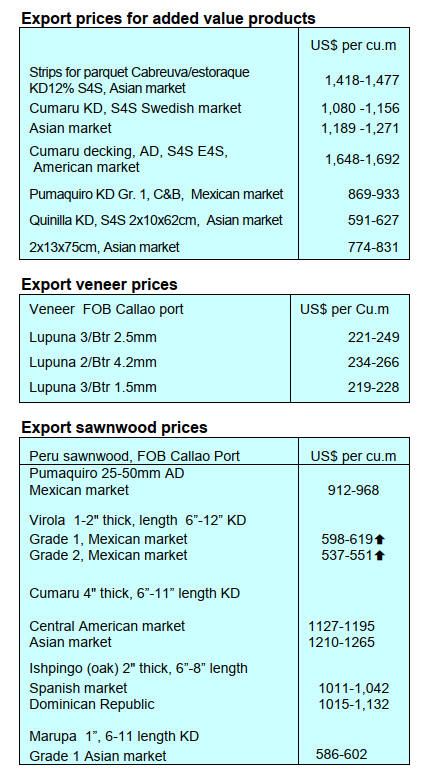
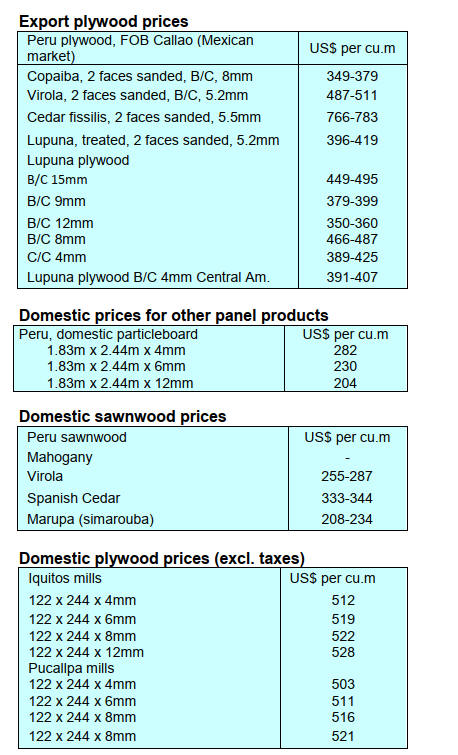
|